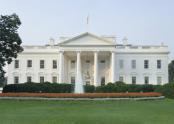President Obama to Tone Down Climate Change Talk

This is President Obama’s week to detail his path
for energizing America and to answer GOP-hopeful
Romney’s scathing attacks. And while some of his
responses will be pointed, others will be dulled --
most likely those discussing the potential of
climate change on the U.S. economy.
When Obama accepts his party’s nomination for the
U.S. presidency on Thursday, he will strike a
reasoned tone. That is, the subject of global
warming and of spending national resources to combat
such an amorphous issue is one that his Republican
opposition cherishes. Therefore, the president will
approach it with a delicacy that conveys that he
understands that his fellow-Americans are pinched
but also in such a way that re-claims his resolve to
create the next-wave of U.S. jobs through the
federal funding of green innovations.
“We will be able to look back and tell our children
that this was the moment ... when the rise of the
oceans began to slow and our planet began to heal,”
Obama intoned during his 2008 nomination.
But that idealism has been tempered in the wake of
challenging times whereby people are mostly
concerned with keeping their jobs. Still, Obama’s
sense of duty is compelling him to keep alive the
pursuit of the modern fuels and tools that would
minimize heat-trapping emissions.
To that end, his outright support of a cap-and-trade
system in which pollution limits are set and
utilities would be given free market incentives to
reach them has been set aside. Today, the goal is a
“clean energy standard” that seeks to have 80
percent of all electric generation emanate from
sustainable or nuclear energy, both of which have
few such carbon releases. Or, that energy would come
from natural gas-fueled or coal-powered generators
that are equipped with the latest and greatest
technologies.
It’s a policy change born out of necessity. It’s
also one that sounds less threatening in today’s
political tumult. But will it be embraced by the
American people and by the industries that would
have to live within that framework?
The short answer is that most people will give green
energy and cleaner fuels the nod if they could be
implemented in a cost-effective manner. And many
utilities would do the same if they are provided a
certain regulatory roadmap. The idea, nonetheless,
will be met with resistance from coal-reliant
utilities.
Central Divide
Indeed, the fork in the road is clearly marked:
Romney is trying to appeal to those who are
convinced that fossil fuels remain the most
dependable and the cheapest form of electric
generation while Obama is reaching out to those who
think that such fuels are dirty and finite, and that
sustainable energies are the path forward.
The debate, though, will get relegated to the mud
pits. Romney, who governed Massachusetts as a
moderate, is now mocking the same positions he once
held: “President Obama promised to begin to slow the
rise of the oceans and to heal the planet,” Romney
said during the Republican convention. “My promise
is to help you and your family.”
Romney has said repeatedly that wind and solar
energies are unreliable and cannot compete with coal
unless they are heavily subsidized. Stumping through
coal country in Ohio, he pledged his undying support
to coal while demonizing Obama’s EPA and his
administration for their “war on coal.”
The choice: Romney wants to reverse or prevent
anymore incremental movements in environmental
regulations while Obama says that coal’s fate is
contingent on investing in pollution controls and
advanced coal generation.
It all circles back to whether addressing climate
change should be a U.S. policy goal and if so, just
what methodology ought to be used. Here, Romney’s
most recent comments within the context of his
revised stance on climate change would connote that
global warming is, at best, a distant problem in
which we don’t have the financial luxury to address
right now.
Obama’s position, conversely, is that the phenomenon
is real and that it is man-made but that it is now
impractical to set firm limits on greenhouse gas
emissions. The nation, therefore, ought to continue
its unyielding quest for innovative technologies
that can adapt to today’s electric generators, all
to create a New Energy Economy that is also
environmentally friendly.
Politicos have long sought to split the economic and
environmental worlds. But the differences are more
subtle and the degree to which they overlap is a
function of whether public policy favors the
traditional or the modern fuels. Obama will now
respond to his critics and articulate his vision,
all as voters decipher the rhetoric and make their
selection for the next U.S. president.
EnergyBiz Insider has been awarded the Gold for
Original Web Commentary presented by the American
Society of Business Press Editors. The column is
also the Winner of the 2011 Online Column category
awarded by Media Industry News, MIN. Ken Silverstein
has been named one of the Top Economics Journalists
by Wall Street Economists.
Twitter: @Ken_Silverstein
energybizinsider@energycentral.com
Copyright © 1996-2012 by CyberTech, Inc. All rights reserved.
To subscribe or visit go to: http://www.energycentral.com
To subscribe or visit go to: http://www.energybiz.com